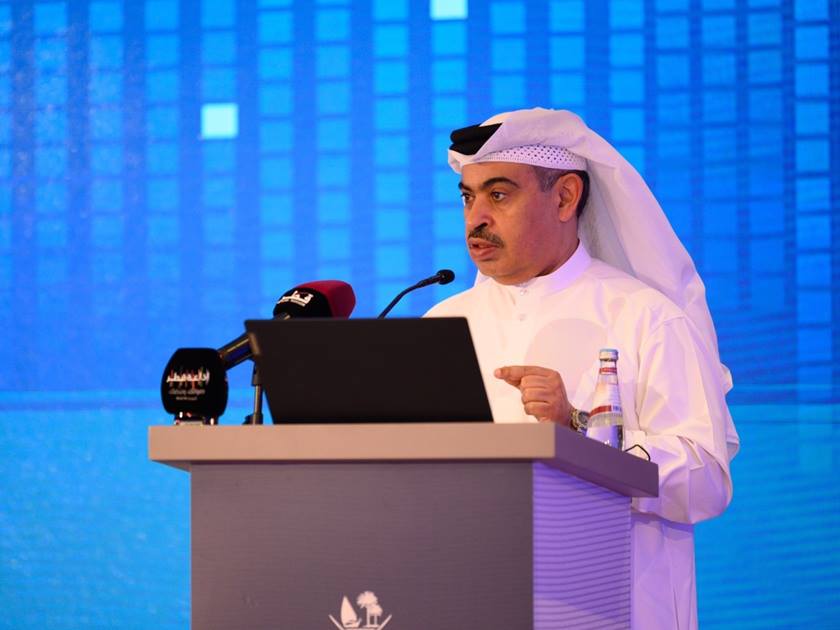Doha, December 20 (QNA) - HE the Minister of Finance Ali bin Ahmed Al Kuwari said that Qatar's budget surplus for the fiscal year 2023, which is expected to reach QR 29 billion, will be directed to paying public debt, supporting the reserves of the Qatar Central Bank, and increasing the capital of the Qatar Investment Authority.
This came during a press conference HE the Minister of Finance held today in which he announced the details of the state's general budget for the year 2023, with total spending amounting to QR 199 billion (USD 54.6 billion) a decrease of 2.6% compared to the current year 2022 budget.
HE the Minister of Finance explained that the general budget was built on the basis of an average oil price of USD 65 per barrel, which is a conservative price adopted by the Ministry of Finance as part of its strategy to ensure the ability to allocate financial resources for existing financial commitments expected during the year, financing programs and projects of the national development strategy.
He added that the total revenues in the fiscal year 2023 budget are estimated at QR 228.0 billion (USD 65 billion), an increase of 16.3% compared to the estimates of the 2022 budget.
The total revenues in the fiscal year 2023 budget are estimated at QR 228.0 billion (USD 65 billion), an increase of 16.3% compared to the estimates of the 2022 budget, he said.
His Excellency attributed the increase in public revenues mainly to the adoption of an average oil price of 65 US dollars per barrel for the year 2023 instead of 55 US dollars per barrel as in the 2022 budget, as a result of the remarkable recovery in global energy prices during the current year, in addition to the estimates of international institutions that prices will continue to rise to rise in the medium term.
Estimates of total oil and gas revenues for the next year amount to QR 186.0 billion, compared to QR 154.0 billion for the year 2022, which represents an increase of 20.8%.
The Minister of Finance revealed that the increase in the estimated revenues for the year 2023, in addition to the limited decrease in expenditures which led to the transfer of the budget balance from a deficit to a surplus estimated at QR 29.0 billion , adding that the Ministry of Finance will work to strengthen the financial reserves of the state by transferring the surplus to the general reserve account in accordance with the provisions of the State Financial System Law promulgated by Law No. (2) of 2015.
As for non-oil revenues, HE the Minister of Finance indicated that the estimates of non-oil revenues for the year 2023 remain constant compared to the 2022 budget., at an amount of QR 42.0 billion, explaining that the ministry is currently working in coordination with the concerned authorities to study the implementation of some measures that will increase the collection of non-oil revenues during the year 2023, including expanding the list of goods covered by the selective tax and reviewing some government fees. Estimates of revenue resulting from the possible application of these measures during the year 2023 were not added to the budget based on the principle of providing conservative estimates of public revenues.
In the context of his talk about expenditures in the general budget for the year 2023, HE Ali bin Ahmed Al Kuwari indicated that the total planned expenditures for 2023 decreased by 2.6% compared to 2022, to reach QR 199.0 billion, explaining that the two most important variables in 2023 expenditures, in comparison with the year 2022, are an increase in spending on salaries and wages and a decrease in spending on major projects. Allocations for salaries and wages in the 2023 budget increased by QR 4.0 billion from 2022 to reach an amount of QR 62.5 billion, which represents an increase of 6.3%.
This increase is attributed to the increase in employment in the public sector in light of the new government structure, which was approved by HH the Amir Sheikh Tamim bin Hamad Al-Thani at the end of 2021, the re-disbursement of grants and some allowances during the current year, in addition to the adoption of the new retirement law and the directives of HH the Amir to adopt the minimum retirement pension.
HE the Minister of Finance attributed the decrease in operating expenses allocations to the costs of sustaining public utilities and infrastructure, which will have an important role in the post-World Cup phase, in light of building an integrated infrastructure that is a fundamental pillar for the development and prosperity of the local economy. In this context, the allocations for major projects for 2023 decreased by 13.6% compared to 2022, to reach QR 63.9 billion, in light of the completion of many planned infrastructure projects and strategic projects, the latest of which is the completion of the expansion of Hamad International Airport before the start of the FIFA World Cup Qatar 2022. The continued high spending in the section of public projects is attributed to the state's directions to complete infrastructure projects, especially those related to existing and new lands of citizens, and projects related to supporting the local economy.
HE the Minister of Finance stated that the allocations for the health and education sectors have been increased for the year 2023 in line with the state's continued focus on investing in them, and these include developing a number of new schools and improving the facilities of some existing schools, in addition to operating a number of new hospitals and health centers and establishing new centers. Spending on the health sector in the next year's budget amounts to QR 21.1 billion, compared to QR 20.0 billion in 2022, which constitutes 11% of the total public budget. As for the education and higher education sector, spending on it amounts to QR 18.0 billion, compared to QR 17.8 billion in the 2022 budget, or 9% of the total budget.
He added that spending on the culture and sports sector amounts to QR 9.3 billion, compared to QR 16.6 billion in the 2022 budget, or 5% of the total budget. The decrease in spending on the culture and sports sector is due to the completion of all projects related to hosting the FIFA World Cup Qatar 2022, in addition to the completion of operating expenses associated with hosting.
In this context, HE the Minister of Finance indicated that the assets that have been developed and are currently available still give the State of Qatar preference in hosting other sporting events and contribute to achieving the country's goal of becoming a global sports hub.
HE. Ali bin Ahmed Al Kuwari noted that the public debt of the State of Qatar decreased from 58% in 2021 to about 44.5% of the Gross Domestic Product (GDP), due to the state paying due amounts of external debt, in addition to the GDP growth at current prices.
The rise in energy prices and the state's fiscal policy, represented in controlling spending, raising its efficiency, and reducing the level of public debt, especially external debt, contributed to the improvement of the country's credit rating.
HE the Minister of Finance revealed that Moody's had raised the country's outlook from stable to positive, while Standard & Poor's had raised the country's credit rating from (AA-) to (AA) with a stable outlook. In this context, His Excellency pointed out that the improvement in the country's credit rating confirms the strength and flexibility of the local economy, in addition to the financial stability witnessed by the country, which increases the country's attractiveness to foreign investments and contributes to reducing the cost of borrowing for the country and the institutions operating in it. (QNA)


